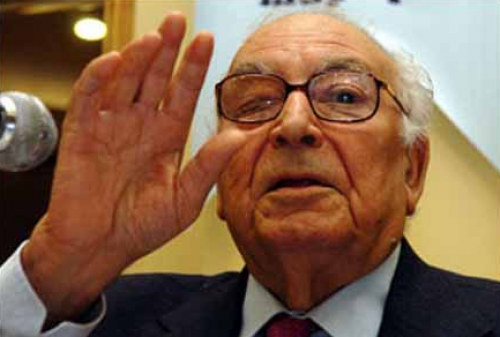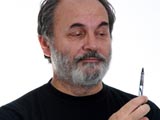Against Debrainization
by Tarık Günersel / March 15, 2013 / No comments
As culture changes, in Turkey and elsewhere, thoughtful concern and activism are essential for positive evolution.

Writer Yashar Kemal was the first president of PEN Turkey after the group was re-established in 1988. Photo: Courtesy of Tarik Günersel.
Literature echoes life and its possibilities. Thus, it’s against the unquestionability of authority. That’s why writers and intellectuals have been threatened, imprisoned, and killed for millennia.

- Life is words in action, literature is action in words.
Humans are about to destroy their spaceship Earth. Some of them are aware of this and they try to change the course of events. Will they succeed? Will more humans be alarmed and do something?
Literature is vital and translators are messengers of world peace.
Though I shall focus on the literary scene in Turkey and its problems regarding freedom of expression, I shall not omit the other parts of our planet. Today local is global and vice versa. 
- Tarık Günersel is a poet, playwright, aphorist, librettist and short story writer. He is the president of PEN Turkey and an ex-member of the PEN International Board. He studied English Literature at Istanbul University. A self-exile after the military coup in 1980, he spent four years in Saudi Arabia with his wife Füsun and their daughter Barış, teaching English. A dramaturg at Istanbul City Theater since 1991, he has acted on stage and screen and directed some of his plays. He proposed World Poetry Day in 1997 which was accepted by PEN International and declared by UNESCO as the 21st of March. His translations into Turkish include works by Samuel Beckett, Vaclav Havel and Arthur Miller. His works include The Nightmare of a Labyrinth (mosaic of poems and stories), and How’s your slavery goin’? His Oluşmak (To Become), a “life guide for myself,” includes ideas from world wisdom of the past four millennia.
Akram Aylisli, a highly respected Azerbaijani writer in his 70s, is in danger at home simply because his literary work, which supports mutual understanding between Azeris and Armenians, has been published in Russia.
Beliefs and ideals have been used as tools of debrainization by those who do not doubt their assumptions and horizons.
The 1980 military coup in Turkey was what I call a “debrainization operation” on a massive scale, with 50 executions, 150,000 people tortured, and some still in prison after more than 30 years. The military junta abolished the Parliament and all political parties, and imposed an antidemocratic constitution. Since then “Theology and Ethics” has been obligatory in schools. It’s a way of imposing Sunni Islam, which is clearly against secularism—a constitutional guarantee.
The current debrainization operation is clearly due to religious pressure. Even the 13th century Turkish humanist poet Yunus Emre has been censored in school books this year. And now Prime Minister Erdoğan’s AKP government demands a new constitution without the concept of secularism. A threat indeed.
But this process of debrainization is not without its opponents. Turkey’s shortcomings in human rights have mostly been criticized by authors.
Yasar Kemal is one of them. Winner of several international prizes, Kemal is among the greatest writers in world history. Now in his late 80s, he has been a Nobel candidate for decades. Never giving in to threats, he has always struggled for democratization and peace: “Half of my heart is Kurdish and half is Turkish,” he has said.
Kemal was the first president of the PEN Turkey Center after its re-establishment in 1988. His linguistic and stylistic genius is like Shakespeare’s: Untranslatable. Actually, considering the English translations of some Turkish novels, here’s an observation: Some novels gain something in translation thanks to better editing, whereas Kemal’s novels inevitably lose some of their magic despite their supreme translators. It’s a pity that the Nobel Committee lacks someone who can read Turkish. It’s not that Yashar Kemal has not won the Nobel Prize. No. So far, the Nobel Committee has failed to win him.
Another author, Leyla Erbil, also deserves to be better known in the international arena. Winner of PEN Turkey’s Fiction Award this year, Erbil has used her avant-garde creativity to write bravely for more than half a century. When PEN Turkey celebrated International Worker’s Day (because literature is hard labor), in spite of the tear gas the police used, Erbil, who is in her 80s, kept walking with the other writers toward Taksim Square, the heart of modern Istanbul.
If you live in a democracy, consider this: While the governments and the social milieu of democratic countries appear flexible, don’t be fooled–under normal conditions, conditions change. At least, they tend to.
Evolution is a fact in biological history, but it should not lead us to conclude that a society will evolve automatically. Optimism related to that assumption is likely to end in disillusionment. That’s why concern and contribution have always been vital.




